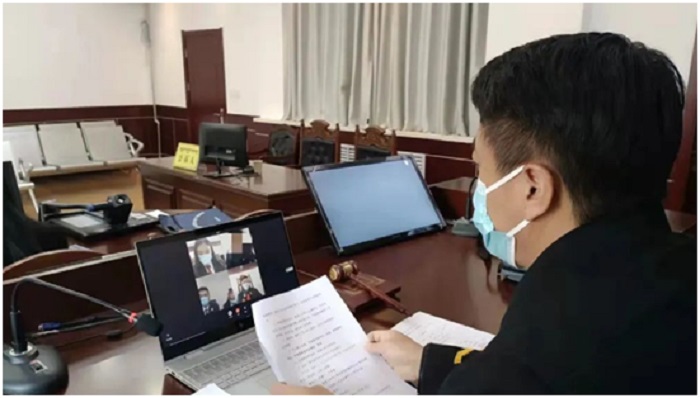



To ensure easier access for rural people to judicial services and popularize legal knowledge among villagers, courts at various levels in Gannan Tibetan autonomous prefecture, northwest China’s Gansu province, have heard cases locally and set up offices in villages and communities to offer people legal services including consultancy, lawsuit mediation, and legal aid.
Thanks to the endeavor which brings judicial and legal services to people’s doorsteps, Gannan Tibetan autonomous prefecture has seen its number of cases handled by judicial authorities as well as the clearance rate, mediation rate and withdrawal rate of cases rise while the appeal rate and number of public complaint cases have dropped over the past nearly three years.
Tsering, a herdsman in Shimen township, Lintan county, Gannan Tibetan autonomous prefecture, benefited greatly from the convenient local hearing mechanism.
On a rainy night of October 2020, Tsering lost two yaks while moving to another pasture. In July last year, he accidentally found the two missing yaks in the herd of Tashi, another local herdsman. After Tashi refused to return the yaks, Tsering called the police, which, however, had difficulty finding out the truth as it had been too long since the yaks were lost.
Tsering then filed a lawsuit against Tashi, which was dismissed at first instance for lack of witness and concrete evidence. After that, Tsering lodged an appeal to the intermediate people’s court of Gannan Tibetan autonomous prefecture.
“One of the two yaks was an adult and the other was young when they wandered away from the herd,” said Mou Siqiong, a judge with the intermediate people’s court of Gannan Tibetan autonomous prefecture, who handled the civil case.
As they had been raised elsewhere for nearly a year, it was not easy to recognize them, especially the young one, according to Mou.
After meticulous field investigations, Mou found a key witness—a veterinarian who had examined the teeth of the young yak. Considering its complexity, Mou decided to hear the case on the pasture.
Last winter, Mou, together with a clerk and two bailiffs from the intermediate people’s court of Gannan Tibetan autonomous prefecture, trekked in the freezing cold for more than three hours to the village where Tsering lives to hear his case. The bailiffs asked Tsering and the veterinarian to identify the lost young yak from Tashi’s herd separately, and their choices were exactly the same. Eventually, Tashi admitted his guilt and returned the lost yaks to Tsering.
In the past, both parties in such cases had to go back and forth between the court located in the urban area of the prefecture and their homes until their cases were settled.
“It’s not easy for herdspeople living in grasslands to travel between the court and their homes,” Mou said, adding that now that judges hear cases locally, these people no longer need to take long-distance trips for judicial services.
Recently, Mou received a message from Tsering saying that the female yak recovered with the help of the intermediate people’s court of Gannan Tibetan autonomous prefecture gave birth to a calf.
Given the fact that most parts of Gannan Tibetan autonomous prefecture are scarcely populated mountainous areas with complex geographical conditions and poor traffic conditions, local courts at various levels have made great efforts to release people from troubles with travel in seeking judicial services.
Instead of asking people to go to courts, judicial functionaries have “brought courts to people” by hearing cases on pastures and in people’s doorsteps, enabling local residents to enjoy fast, convenient, and highly efficient litigation services and helping save their time, energy and cost.
Yang Xiaogang, a resident of Liushun township, Lintan county, Gannan Tibetan autonomous prefecture, who overturned his car when driving under the influence, has also experienced first-hand the convenience of local hearings.
Since Yang underwent two operations during the period of obtaining the guarantor and pending trial and had difficulty in moving, the people’s court of Lintan county heard his case of drunk driving in his home on June 8, 2021.
Yang pleaded no contest to the facts, charges and sentencing suggestions during the litigation. Chang Xiufang, the judge at the court, sentenced Yang to three months’ detention and a fine of 1,000 yuan ($158.4) in accordance with the country’s fast-track sentencing procedure for criminal cases.
“Hearing cases in people’s homes can both manifest the authority of the law and the tenderness of judges,” said an official with the people’s court of Lintan county, who disclosed that dozens of Yang’s neighbors watched the court hearing of Yang’s case.
By handling judicial proceedings locally for people living in remote villages with poor traffic conditions, judicial functionaries can achieve the goal of popularizing knowledge of the law among local residents while hearing cases, the official noted.
Courts in Gannan Tibetan autonomous prefecture have also integrated smart technologies into the local judicial system and established new mediation platforms combining online and offline means, in a bid to better serve the people.
Since the outbreak of the COVID-19 pandemic, courts of the prefecture have handled many cases online for the convenience of local residents. The efforts to move litigation online have not only brought convenience to local people, but improved the efficiency and effectiveness of judicial proceedings.


The Executive and members of the.


The Acting Director, FCT Directorate of.


President Bola Ahmed Tinubu has been.



Barely a month after resignation of.


An Abuja based Legal Practitioner, Osuagwu.



Convener of Equitable Remedy, Mrs. Magaret.


Contractors handling the contract for city.


Nigerian government may have concluded plans.


The Diplomatic Correspondents Association of Nigeria.


A rights group, “Follow Me Talk.
Leave a Comment